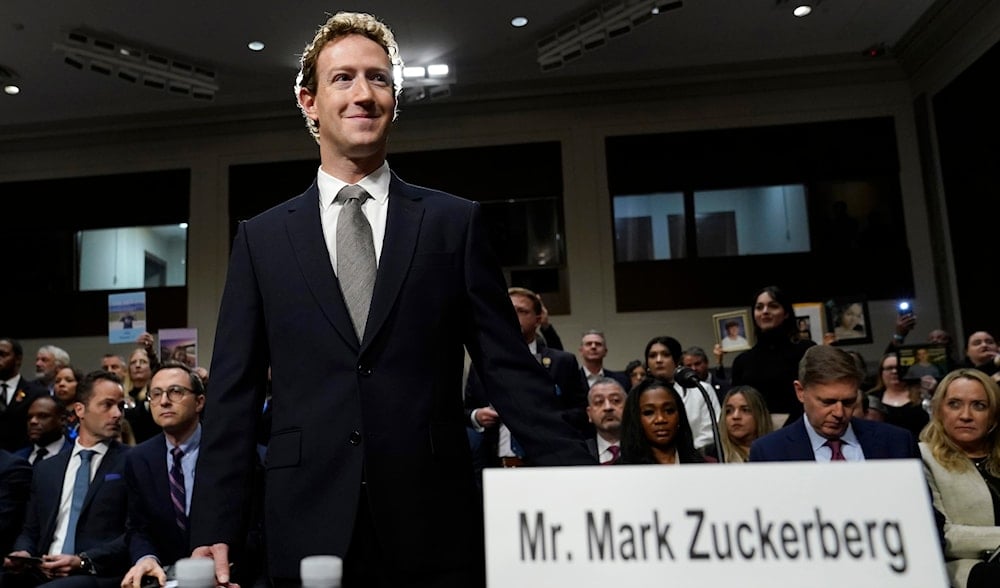Meta fires engineer for fixing bug that bans Palestine content
Palestinian-American Ferras Hamad files a lawsuit in a California state court for discrimination and wrongful termination as he accuses Meta of bias against Palestinians and their content.
-

Meta CEO Mark Zuckerberg arrives to testify before a Senate Judiciary Committee hearing on Capitol Hill in Washington, Wednesday, January 31, 2024. (AP)
Tech giant Meta has fired an engineer for trying to fix a bug causing the blocking of Instagram posts about Palestine, and the engineer has accused Meta of bias in its handling of content related to the war on Gaza.
Palestinian-American engineer Ferras Hamad, who has been employed at Meta since 2021, filed a lawsuit in a California state court for discrimination and wrongful termination, accusing the company of bias against Palestinians. He said the company even deleted internal employee communications mentioning the deaths of their relatives in Gaza and conducted investigations into their use of the Palestinian flag emoji.
The lawsuit further states that no similar investigations have been launched before for employees posting Israeli or Ukrainian flag emojis in similar contexts.
Hamad notes that his dismissal was due to an incident in December regarding an emergency procedure to troubleshoot severe problems with the platforms, known within Meta as a SEV or "site event".
According to the complaints in the lawsuit, Hamad noticed irregularities in the SEV policies related to restricting content posted by Palestinian Instagram accounts, such as posts being prevented from appearing in searches and feeds.
Read next: Meta knew of child exploitation subscriptions, allowed them anyway
One instance cited in the complaint revealed that Hamad stumbled upon a short video posted by Palestinian photojournalist Motaz Azaiza which was mislabeled as adult content even though all it included was a destroyed building in Gaza.
The engineer explained receiving mixed guidance from many employees about the status of the SEV, and if he had the authority to work on it as he did on many SEVs before, including ones related to "Israel", Gaza, and Ukraine. It was later confirmed in writing that the SEV was part of his job, per his manager.
Hamad said Meta told him he was fired for violating a policy barring employees from working on issues with accounts of people they know personally, referring to Azaiza, to whom Hamad said he had no personal connection.
A hefty track record
Back in December, Meta's independent oversight board rebuked the social media giant for removing posts depicting human suffering in the war on Gaza.
The board overturned two decisions, including the removal of an Instagram video exposing the aftermath of a strike near Al-Shifa Hospital in Gaza during the Israeli ground invasion. The video depicted injured or killed Palestinians, including children.
While several other videos of the sort were being discussed, oversight board co-chair Michael McConnell stated that these decisions were challenging. He claimed that the board is focused on protecting freedom of expression while preventing content that incites violence or hatred.
The board urged Meta to preserve removed posts that might serve as evidence of human rights violations.
Back in February, sources revealed to The Intercept that Meta was considering stricter rules for discussing so-called Israeli nationalism on its platforms.
Five civil society sources briefed on the potential change told The Intercept that according to an email sent by Meta policy personnel “Meta is currently revisiting its hate speech policy, specifically in relation to the term ‘Zionist.'’”
Dani Noble, an organizer with Jewish Voice for Peace, expressed that the organization was "horrified" to hear that the term Zionist, which is a political ideology would be conflated with Jewish, which is an "ethno-religious identity."
Meta's internal guidelines regarding the word "Zionist," originally published by The Intercept in 2021, claimed that company moderators are only intended to remove postings containing the phrase if they are considered to be a proxy for "Jewish" or "Israeli," both of which are protected classes under corporate speech policies. Meta is now proposing a policy change that would allow the platform's moderators to more aggressively and expansively apply this restriction, perhaps increasing removals of posts critical of Israeli nationalism.

 4 Min Read
4 Min Read








